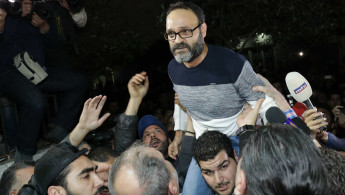Lebanese actor Ziad Itani ‘summoned for interrogation’ over tweet
Ziad Itani, a popular Lebanese writer and actor, was summoned for questioning over his Twitter posts, a move condemned by human rights organisations.
Itani was detained and tortured in 2017 in an unofficial detention site, where he was forced to sign a confession stating he had collaborated with Israel.
The actor was released in March 2018 after it was revealed that the former head of the Anti-Cybercrime Bureau Suzanne Hajj Hobeiche had fabricated the case against him over a Twitter row. Hobeiche was subsequently arrested.
"Despite being a victim of abuse, Itani has been treated like a criminal. He was interrogated by the agency previously headed by the person who framed him," said Lama Fakih, deputy Middle East director at Human Rights Watch.
Itani was summoned by the Lebanese Internal Security Force Cybercrimes Bureau after a complaint made by Ziad Hobeiche, the husband of Suzanne Hajj Hobeiche.
Read also: Therapy through theatre: Ziad Itani details his experience of torture and solitary confinement in Lebanon
The questioning of Itani by the ISF "on the basis of a criminal defamation complaint by the husband of the person who falsely accused Itani is the latest example of how nefarious Lebanon’s criminal defamation laws are," added HRW’s Fakih.
"Itani's allegations of enforced disappearance and torture in 2017 have never been investigated, and there has been zero progress on the lawsuit he filed more than three months ago against the interrogator he alleges tortured him," said Fakih.
|
Hobeiche allegedly attempted to take revenge on Itani by framing him for passing on information about Lebanese officials to a female Israeli Mossad agent.
Hobeiche was once a leading figure in Lebanon's intelligence agency but was fired after Itani shared a screenshot showing that Hobeiche had "liked" a tweet that said Saudi women would only be allowed to drive if their vehicles are rigged with explosives.
Itani has shot to prominence in recent years because of a series of comedy plays on Beirut and the transformations it has undergone in recent decades.
Before becoming an actor, Itani worked as a reporter with Lebanon's Al-Mayadeen television channel and with various regional newspapers.





 Follow the Middle East's top stories in English at The New Arab on Google News
Follow the Middle East's top stories in English at The New Arab on Google News
![Netanyahu furiously denounced the ICC [Getty]](/sites/default/files/styles/image_330x185/public/2024-11/GettyImages-2169352575.jpg?h=199d8c1f&itok=-vRiruf5)
![Both Hamas and the Palestinian Authority welcomed the ICC arrest warrants [Getty]](/sites/default/files/styles/image_330x185/public/2024-11/GettyImages-2178351173.jpg?h=199d8c1f&itok=TV858iVg)
